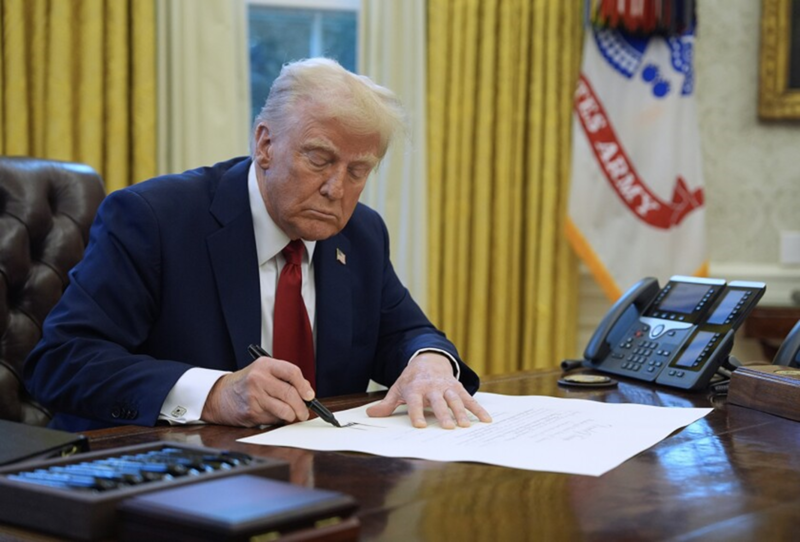Education Spending Cuts Implemented by the Trump Administration: A Significant Change in U.S. Policy
Input
Modified
The Effect of Education Budget Cuts Political and Legal Repercussions

The Effect of Education Budget Cuts
The education sector has been jolted by the Trump administration's most recent initiatives to reduce education funding. The Department of Government Efficiency (DOGE), which is lead by Elon Musk, has spearheaded these cuts, which have focused on research initiatives and diversity, equity, and inclusion (DEI) programs with the objective of enhancing student outcomes. The sweeping nature of these cuts has sparked a fierce debate among policymakers, educators, and advocacy organizations, resulting in legal battles and public outcry. A broader initiative by the administration to reduce federal involvement in education and transfer control to the states is the foundation of this policy shift.
DOGE, which was established to eliminate government expenditure that the administration considers "wasteful," has concentrated on the dismantling of DEI initiatives in education. The Trump administration has contended that these programs are incompatible with federally funded educational institutions and promote divisive ideologies, including Critical Race Theory. In accordance with this perspective, DOGE promptly implemented a reduction of more than $600 million in grants that were allocated for teacher training programs that included DEI components.
In addition, the Department of Education has been instructed to enforce new regulations that necessitate schools to deconstruct DEI offices and initiatives within two weeks or forfeit federal grant funding. This radical measure encompasses student organizations that prioritize diversity or equity initiatives, faculty hiring practices, and admissions policies. The administration maintains that these measures are consistent with a recent Supreme Court decision that prohibits the use of race in college admissions. They also contend that the elimination of DEI programs guarantees adherence to the law.
The Institute of Education Sciences (IES) has suffered one of the most substantial losses as a result of the administration's budget adjustments, as it has lost nearly $900 million in contracts. The IES was tasked with the development of critical research on the following topics: literacy rates, educational access for students with disabilities, and strategies to enhance overall student success. Programs such as "Charting My Path for Future Success," which provided assistance to secondary school students with disabilities as they transitioned to higher education or the workforce, were abruptly discontinued. These cuts have been condemned by educators and researchers, who have cautioned that the integrity of essential data-driven strategies to enhance education equity will be jeopardized in the absence of federal support.
Furthermore, the decrease in funding for education research has resulted in numerous academicians and institutions being unable to continue their work. Research that has the potential to influence the development of more effective educational policies and teaching methodologies is currently in jeopardy, which could impede the advancement of classroom technologies and learning strategies. In many cases, universities that were previously dependent on federal research grants have been compelled to pursue alternative funding sources, which frequently results in increased tuition fees or program cutting.

Political and Legal Repercussions
Legal disputes and political disputes have ensued as a consequence of the reductions. The American Federation of Teachers (AFT) and the American Sociological Association have filed lawsuits against the administration, contending that the dismantling of DEI programs violates constitutional protections. They argue that DEI initiatives are indispensable for cultivating inclusive educational environments and providing students with the critical thinking skills required for a diverse workforce.
Democratic lawmakers have also requested transparency in the administration's decision-making. In a formal letter to the Department of Education, they have requested that the administration provide a comprehensive explanation of the criteria used to determine which programs were eliminated and how the administration intends to mitigate the resulting impact on students and educators. They contend that these policies are being implemented without a clear roadmap for their consequences and with minimal public input.
In addition to the immediate reductions, the Trump administration has established the foundation for a more extensive restructuring of the U.S. education system. The dissolution of the Department of Education is a critical component of this strategy, which aims to delegate education supervision to the states.
Linda McMahon, Trump's nominee for Secretary of Education, has affirmed that the administration plans to transition the functions of federal education programs to state governments and phase them out. She has assured legislators that critical initiatives, such as Title I funding for low-income schools and Pell Grants for college students, will be maintained, at least in the short term. Nevertheless, critics are concerned that the transfer of education responsibilities to the states could result in heightened disparities in education quality and access. This is due to the fact that affluent states may have the resources to support their schools, whereas low-income states may struggle to maintain funding levels.
Additionally, civil rights organizations have cautioned that the erosion of hard-won protections for marginalized students could result from giving states the authority to establish their own education policies with minimal federal oversight. Policies that guarantee equitable access to education, special education services, and protections against discrimination may be undermined or completely abandoned in the absence of federal enforcement.

The Future of Education Policy in the United States
Part of a broader trend of diminishing federal supervision across a variety of agencies, the Trump administration's actions against DEI and research funding in education. DOGE has implemented comparable reductions in numerous government departments, including the Internal Revenue Service and the Department of Defense. These reductions have led to the cancellation of contracts associated with public service programs and diversity initiatives, as well as pervasive layoffs. The administration argues that these reductions are necessary to eliminate inefficiencies and reduce the burden on taxpayers. However, critics contend that they are being implemented at an excessive pace, without adequate consideration of their long-term repercussions
The federal government's role in ensuring educational equity is fundamentally challenged by the Trump administration's approach to education funding and policy. Advocates of the administration's approach contend that state control will facilitate the development of policies that are more specifically tailored to the values and requirements of the local community. They assert that the removal of federal influence will decrease bureaucratic inefficiencies and free up resources for direct classroom instruction.
In contrast, opponents caution that the federal government is essential for the preservation of standards and the provision of necessary support to vulnerable student populations. Throughout history, federal funding and oversight have been essential in the implementation of student loan protections, special education programs, and desegregation initiatives. Students from lower-income backgrounds and communities of color may be disproportionately affected, as disparities in education access and quality may widen in the absence of a centralized approach.
The U.S. education policy has reached a critical juncture with the Trump administration's aggressive posture on education spending cuts, DEI initiatives, and federal oversight. However, critics contend that these measures will undermine efforts to establish an inclusive and equitable education system, despite the fact that supporters regard them as essential steps toward reducing government excess.
The future of American education is uncertain as legal battles persist, and state governments prepare for a potential shift in responsibility. The educational opportunities that students have today, as well as the long-term structure of the nation's education system, will be influenced by the decisions that are made in the future years. Will these reductions result in a more efficient, locally controlled education system, or will they undermine the most vulnerable pupils in the country's protections and resources? The legacy of these policies for future generations will be determined by the response to that query.
Ultimately, education is a fundamental component of social mobility and economic development. The United States' ability to remain competitive in a global economy that is becoming increasingly knowledge-driven will be determined by the decisions made today, which will have an impact on future generations. Policies will be influenced for years to come by the ongoing debate between federal and state control of education, which will affect the way schools operate and the readiness of students to confront the challenges of the contemporary world.





















